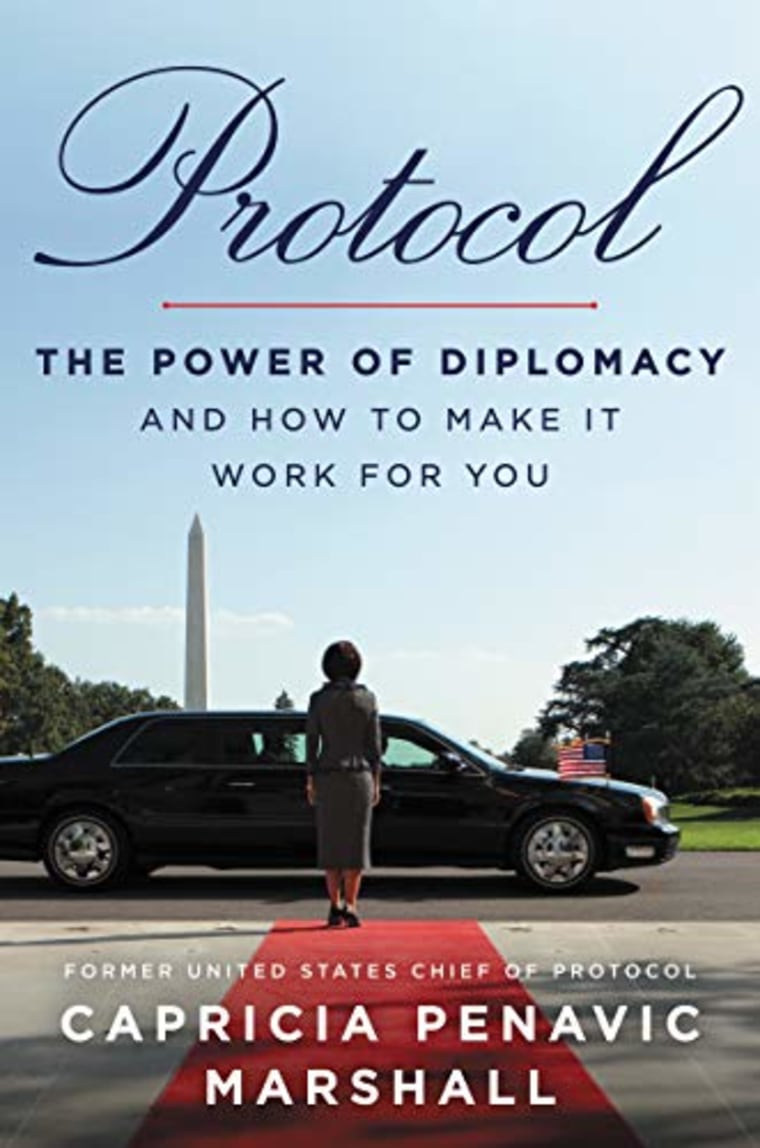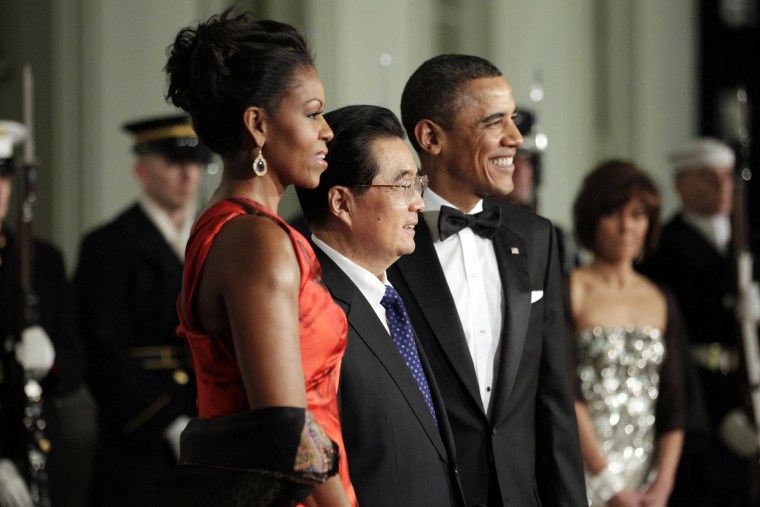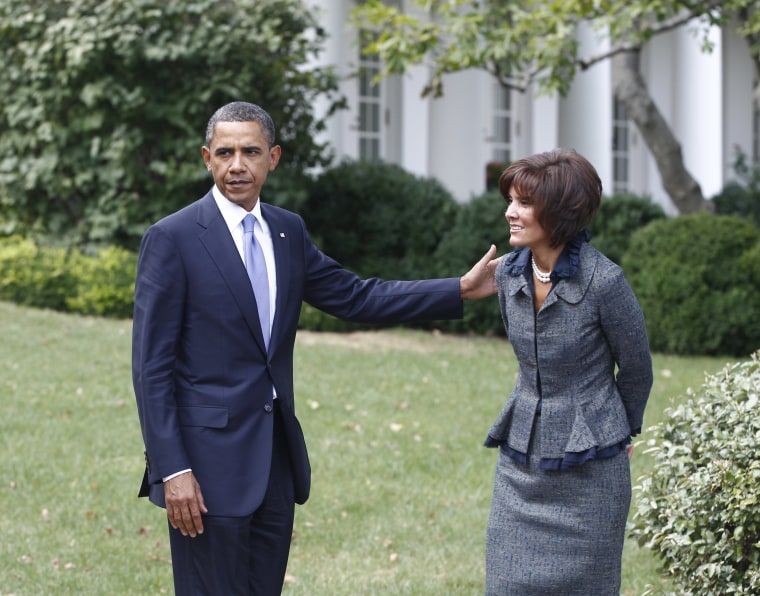Capricia Marshall knows the smallest details can make a very big impact.
The former Chief of Protocol under President Obama recently chatted with Know Your Value founder and “Morning Joe” co-host Mika Brzezinski about why diplomacy and etiquette matter, not only on the international stage, but in everyday life too.
From picking a room with the appropriate ceiling height, to convincing Obama to make noodles with a world leader, Marshall shared stories illustrating how the smallest gestures laid the groundwork for successfully diplomacy. She also discussed how we can make protocol work for us, especially during these uncertain, contact-less times.
Mika Brzezinski: Tell me what your new book “Protocol” is about.
Capricia Marshall: “Protocol” creates a road map for every diplomatic interaction. For example, at the G-20 trip in Mexico, President Obama and President Putin had their first leader-to-leader meeting where they would be discussing some pretty heavy topics.
To make sure the United States had the advantage in those negotiations, we leveraged every tool at our disposal from the size of the room to the ceiling height. We wanted to create a really intimate space in order to make President Putin feel as though his back was — literally! — against the wall. These efforts pushed President Putin to negotiate allowing our two countries to emerge from the meeting closer on several of the key matters.

Mika Brzezinski: Protocol and etiquette are often seen as old-fashioned, upper-class cultural habits. Why is it still relevant and how does it apply to everyone?
Capricia Marshall: We all engage in our own personal diplomatic efforts, which are strengthened by the foundation of protocol: respect.
Here’s an example: At a private dinner with President Hu during President Obama’s State Visit to China, my Chinese counterpart fervently requested that President Obama make a noodle with President Hu because it was an important cultural tradition. I whispered the request in President Obama’s ear. He looked at me with a squint that indicated a “What do you want me to do?” A look I would see often thereafter. I emphasized that this was important to them. Without another word, he said “Let’s make a noodle.” Standing shoulder to shoulder, they bounced a piece of dough as it lengthened into a noodle, which became the foundation of their productive working relationship.

Showing respect for others’ cultures is at the core of protocol, whether that’s in your personal life, your professional activities or on the global stage.
Mika Brzezinski:You traveled the world with President Obama. How did you see him grow as a global leader?
Capricia Marshall: The presidency of the United States is a power like no other. I’ve seen two men assume that position and the gravity of the responsibilities it entails. But, it takes a minute.
President Obama fully owned his role as leader of the free world at the signing of the Strategic Arms Reduction Treaty in the Czech Republic. He sought out protocol guidance and when necessary used it as a tool in the negotiations. Refusing to begin talks without his interpreter (in lieu of using the interpreter of his counterpart), valuing the importance of the specificity of language. As well, empathetically setting the stage with his Russian counterpart by creating an appearance of parity as they signed the important document.
He understood that the United States has so much more influence at these international meetings when every detail is attended to and when he uses an opportunity to create a bridge in a relationship.
Mika Brzezinski: You talk about how President Trump shook the hand of a North Korean leader, derailing his agenda and detracting from his trip's purpose. How does a protocol misstep impact foreign policy objectives?
Capricia Marshall: Protocol is meant to create the environment for important negotiations to take place. When a misstep is made because a leader wasn’t briefed properly or doesn’t respect the importance of these guidelines, it becomes the story instead of your intended policy outcome.
In this instance, President Trump returned the salute of another country’s General with whom we do not have diplomatic relations. Any objective of moving the needle in the relationship between the U.S. and North Korea was diminished by this act because the salute became the story — not the negotiations.
Mika Brzezinski: Why do you call Vice President Biden and former Secretary of State Hillary Clinton "masters of diplomacy”?
Capricia Marshall: Vice President Biden and Secretary Clinton understand how to use the tools at their disposal to build and bridge relationships. Vice President Biden leans on empathy and the power of connections. At every engagement I attended with him in the Roosevelt Room, he would immediately look to build a connection with his counterparts in order to get things done. In fact, he would do so much prep work to ensure he knew every detail he could possibly use to build bridges that he was frequently late to these meetings!
Secretary Clinton, like Prime Minister Ardern is demonstrating in New Zealand right now, employed the clarity and collaboration of a true diplomat — a skill women seem to have in abundance. She acted quickly when a crisis arose. Collected a variety of opinions to determine the best strategy. And then decisively implemented the strategy. Communicating the strategy with empathy – to gain trust helped make her effective.
Mika Brzezinski: You talk about protocol as a "soft power" tool. What is soft power and why does it matter?
Capricia Marshall: Soft power is the use of non-coercive influence in diplomacy. The idea is to draw your counterparts into consensus as opposed to forcing it using the military. This creates those necessary bridges of understanding. When President Obama was invited to the U.K. for a State Visit by HM the Queen, we knew we had to use this opportunity to demonstrate the importance of the relationship. We chose a leather portfolio containing memorabilia from her father’s last visit to the United States for her to call out the enduring relationship between our two countries. These gifts deepened the already “special relationship”.
Mika Brzezinski: How do we apply lessons in protocol to a contact-less world?
Capricia Marshall: Protocol provides clarity to our social rules of conduct helping us navigate these uncharted times.
While the circumstances might change, the same rules apply: 1. Respect. Pay attention to your local regulations and be flexible with your guests’ comfort levels. You can’t shake hands, so use verbal cues to assist 2. Communicate: Be transparent in your expectations and plans. On a Zoom call, make introductions. 3. Prepare: have masks on hand for live meetings. Intentionally choose your background for virtual calls.
